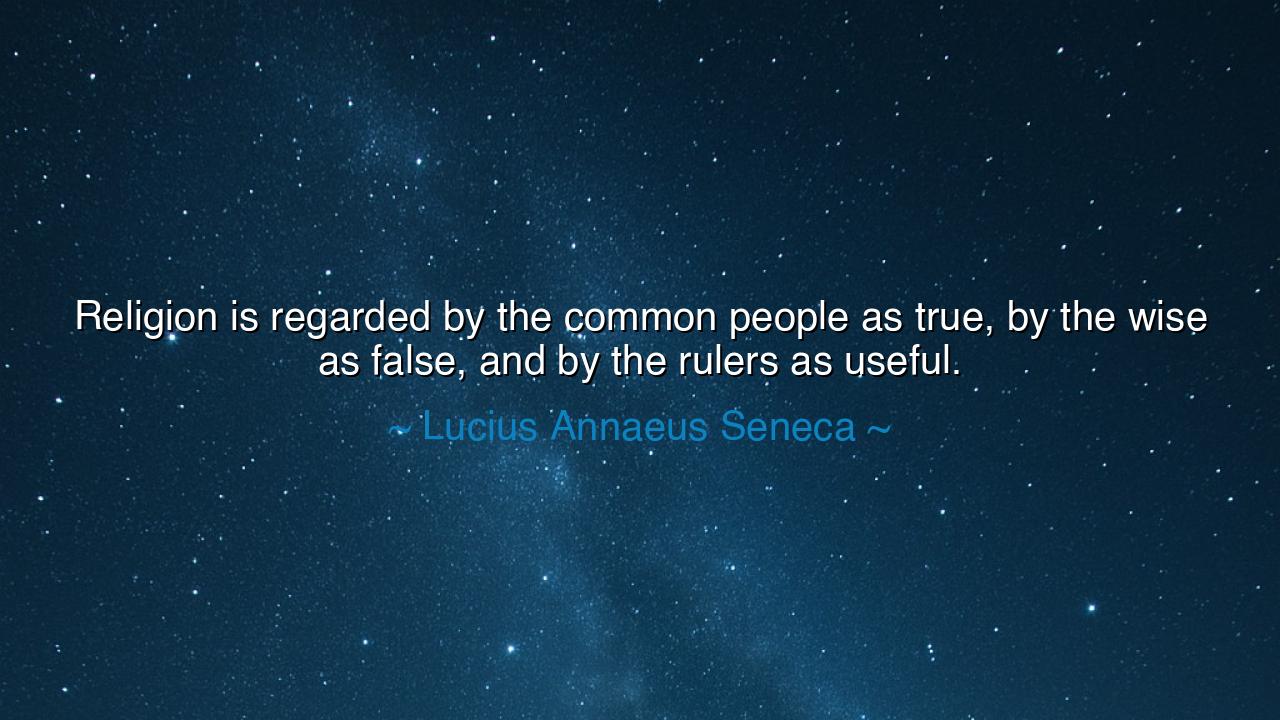
Religion is regarded by the common people as true, by the wise as
Religion is regarded by the common people as true, by the wise as false, and by the rulers as useful.






"Religion is regarded by the common people as true, by the wise as false, and by the rulers as useful." Thus wrote Lucius Annaeus Seneca, the Stoic philosopher of imperial Rome, whose wisdom still pierces through the ages like a blade of reason cutting through the veils of illusion. In these words, he does not mock faith, but reveals a profound truth about power, belief, and understanding—three forces that have shaped human civilization since the dawn of time. Seneca, who lived in the shadow of emperors and the glare of public virtue, had seen how men spoke of the gods not always out of reverence, but often out of fear, ambition, or control. His words are both a lament and a lesson, for they expose how religion, though born from the hunger of the soul for meaning, can be twisted by the hands of men for purposes less divine.
To the common people, Seneca says, religion is regarded as true. This is not meant as scorn, but as recognition of the natural human yearning for purpose and order. The common man looks upon the world with awe—the sunrise, the thunderstorm, the mystery of birth and death—and he seeks an explanation greater than himself. In this seeking, religion becomes his comfort, his compass, his connection to the infinite. The rituals, the prayers, the sacred stories—they bind his heart to hope. He believes because belief gives life meaning. The truth of religion, to him, is not measured by logic but by faith; it sustains him when reason fails, and it weaves the invisible threads of community and trust among men.
But to the wise, says Seneca, religion appears false. The philosopher sees beyond the veil of myth to the structures of power and superstition beneath. He watches as priests declare the will of the gods in order to control the will of men, as rulers use divine authority to justify their rule. The wise man perceives that much of what is called religion is a mirror of human fear and vanity—a projection of man’s desire to explain what he does not understand. Yet, the truly wise do not always condemn belief itself; they discern between the essence of the divine and the trappings of dogma. They know that while religion’s outward forms may be false, its inward longing for meaning is eternal and pure. Seneca himself, though skeptical of the myths of Olympus, believed deeply in a universal reason, a divine order that governs all things—a God not carved in temples but dwelling within the soul.
And to the rulers, religion is useful. Here Seneca’s words carry both irony and warning. For he had lived under emperors who cloaked tyranny in the garments of piety. They used religion as a tool to bind the people, to keep them obedient, to sanctify conquest and power. The masses were told that the emperor ruled by divine right, that disobedience was heresy, that loyalty to the throne was loyalty to the gods. Thus, religion became the chain that gilded servitude. Seneca saw this clearly during the reign of Nero, his own pupil turned despot, whose cruelty hid behind the mask of divine favor. The philosopher’s heart grieved at how the sacred flame of faith could be turned into a weapon of control.
Yet, within this cynical observation lies also a call to discernment. Seneca does not say that religion is evil, but that its meaning changes according to the soul of the one who beholds it. To the simple, it is a mystery to be cherished; to the wise, a mystery to be understood; to the powerful, a force to be wielded. The tragedy, he implies, is not in belief itself but in its corruption. When faith becomes an instrument of fear rather than a path to virtue, when devotion is used to divide rather than unite, the divine loses its light and becomes a shadow.
The history of the world offers many mirrors to this truth. In every age, there have been rulers who invoked heaven to justify their earthly ambition—from pharaohs claiming kinship with the gods to kings anointed by priests to bless their wars. Yet there have also been saints, prophets, and reformers who rose to cleanse faith of its corruption, who returned religion to its spiritual source. Consider Martin Luther, who centuries after Seneca nailed his protest to the church door. His defiance was not against faith itself, but against its misuse. In his courage we see the same wisdom that Seneca glimpsed—that true piety belongs not to those who manipulate the sacred, but to those who seek the divine with honesty of heart.
So, my listener, let this teaching settle in your soul: question what you are told to worship, yet do not let skepticism harden your spirit. Seek the truth behind belief, and honor the yearning that drives humanity to reach toward the eternal. Remember that faith and reason are not enemies but companions—one asks, the other answers. When you encounter religion, look not at the temple or the throne, but at the heart that kneels or commands. There you will see its nature revealed.
And thus, the lesson endures: the divine cannot be owned, only honored. To the blind, it becomes superstition; to the cunning, a weapon; but to the pure of heart, it is life itself. Walk, then, neither in naive faith nor cold disbelief, but in the middle path of wisdom—where reverence meets reason, and truth, though veiled in mystery, shines through the soul like sunlight through the clouds.






AAdministratorAdministrator
Welcome, honored guests. Please leave a comment, we will respond soon